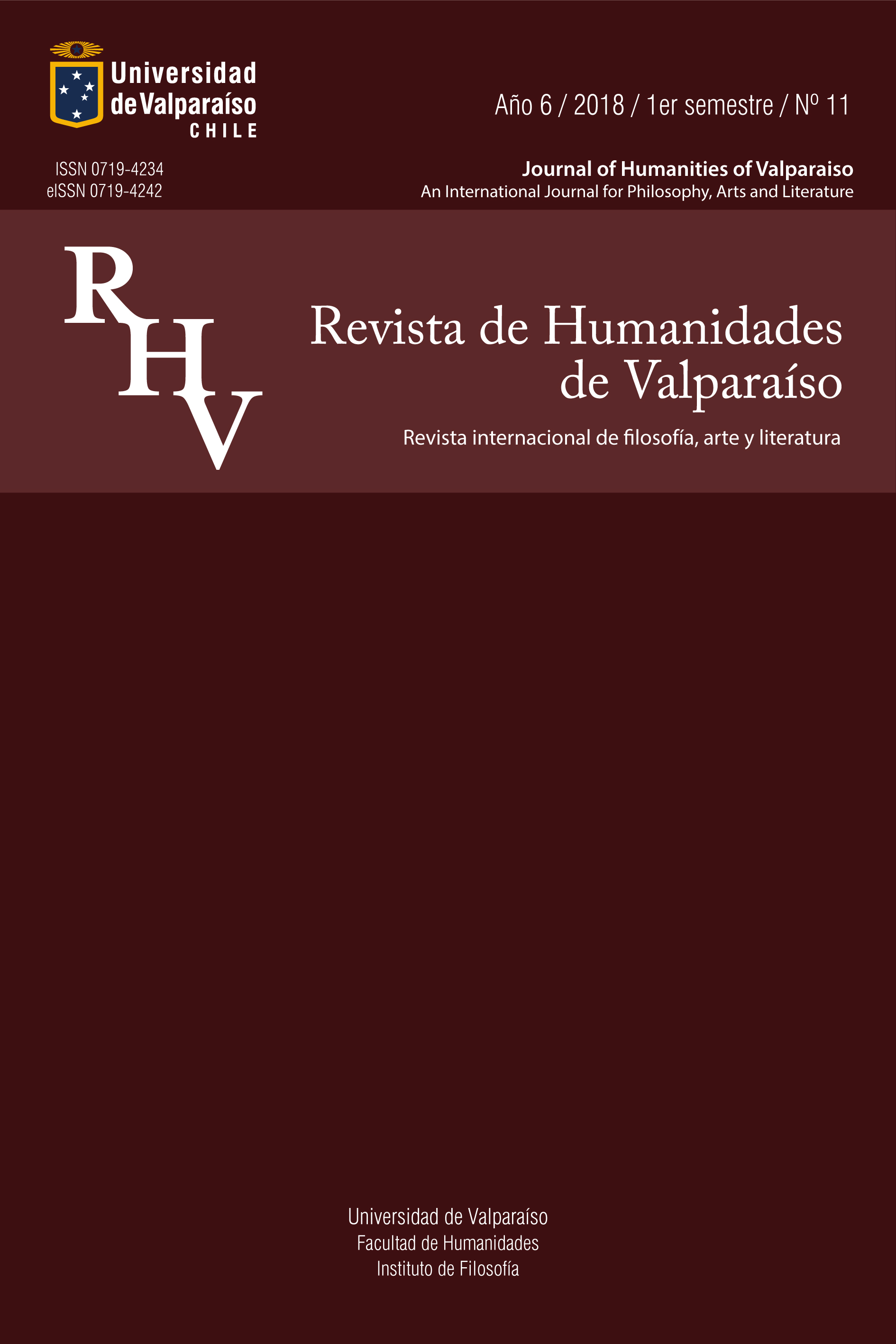Sartre: una teoría auto-representacional de la conciencia
DOI:
https://doi.org/10.22370/rhv2018iss11pp115-137Palabras clave:
Conciencia fenoménica, carácter subjetivo, teoría auto-representacional de la conciencia, conciencia pre-reflexiva, auto-intimaciónResumen
El objetivo de este trabajo es proponer una teoría auto-representacional de la conciencia fenoménica desde Sartre. Para ello clarificaré y mostraré la cercanía de dos ideas. La primera de ellas es la llamada teoría auto-representacional de la conciencia, que sostiene que un estado mental es consciente si y solo si se representa a sí mismo de manera correcta. La segunda de ellas son las descripciones de la conciencia de Sartre, las cuales dicen que toda conciencia es a la vez autoconciencia de sí, o de manera más precisa: toda conciencia posicional de un objeto es a la vez conciencia no posicional de sí misma. Con lo anterior, la conciencia fenoménica sería autoconciencia de sí y la autoconciencia de sí sería auto-representación.
Descargas
Referencias
Álvarez González, Eduardo (2008). “La Cuestión del Sujeto en la Fenomenología Existencial de Jean Paul Sartre”. Estudios de Filosofía, N°38. Antioquia: Instituto de Filosofía de la Universidad de Antioquia.
Barnes, Hazel (1992). “Translator’s Introduction”. En Sartre, J-P., Being and Nothingness. New York: Washington Square Press.
Brentano, Franz (2009). Psychology from an Empirical Standpoint. London: Routhledge.
Brogaard, Berit (2012). “Are conscious states conscious in virtue of representing themselves? On Uriah Kriegel’s Subjective consciousness: a self-representational theory”. Philosophical Studies, Volumen 159, N°3. Dordrecht: Springer.
Catalano, Joseph (1985). A Commentary on Jean-Paul Sartre’s “Being and Nothingness”. Chicago: The University of Chicago Press.
Gallager, Shaun y Zahavi, Dan (2014). “Phenomenological Approaches to Self-Consciousness”. En Stanford Encyclopedia of Philosophy. Consulta: 12 de julio de 2016: http://plato.stanford.edu/entries/self-consciousness-phenomenological/
Gennaro, Rocco (1996). Consciousness and Self-Consciousness. A Defense of the Higher-Order Thought Theory of Consciousness. Amsterdam/Philadelphia: John Benjamins Publishing Company.
Husserl, Edmund (2006). Investigaciones Lógicas 1. Madrid: Alianza Editorial.
Kriegel, Uriah (2003). “Consciousness, Higher-Order Content, and the Individuation of Vehicles”. Synthese, Volumen 134, N°3. Dordrecht: Springer.
Kriegel, Uriah (2006). “The Same-Order Monitoring Theory of Consciousness”. En Uriah Kriegel y Kenneth Williford (eds.), Self-Representational Approaches to Consciousness. Cambridge/London: A Bradford Book The MIT Press.
Kriegel, Uriah (2009a). “Self-Representationalism and Phenomenology”. Philosophical Studies, Volumen 143, N°3. Dordrecht: Springer.
Kriegel, Uriah (2009b). Subjective Consciousness. A Self-Representational Theory. New York: Oxford University Press.
Kripke, Saul (2005). El Nombrar y la Necesidad. México, D.F.: Universidad Nacional Autónoma de México.
Nagel, Thomas (2003). “¿Cómo es ser un murciélago?”. En Maite Ezcurdia y Olbeth Hansberg (eds.), La Naturaleza de la Experiencia. Volumen I: Sensaciones. México, D.F.: Universidad Nacional Autónoma de México.
Ortiz, Esteban (2015). Cuadernos de Filosofía, N°33. Concepción: Departamento de Filosofía de la Universidad de Concepción.
Rowlands, Mark (2011). “Jean-Paul Sartre’s Being and Nothingness”. Topoi, año 30, N°2. Dordrecht: Springer.
Sanfélix, Vicente (2003). Mente y Conocimiento. Madrid: Editorial Biblioteca Nueva.
Sartre, Jean-Paul (1968). La trascendencia del Ego. Buenos Aires: Ediciones Calden.
Sartre, Jean-Paul (1993). El Ser y la Nada. Barcelona: Altaya.
Sebastián, Miguel Ángel (2012). “Uriah Kriegel Subjective Consciousness: A Self-Representational Theory”. Disputatio, Volumen IV, N°32. Lisboa: Philosophy Centre of the University of Lisbon.
Strawson, Galen (2015). “Self-intimation”. Phenomenology and the Cognitive Sciences, año 14, N°1. Dordrecht: Springer.
Wider, Kathleen (1989). “Through the Looking Glass: Sartre on Knowledge and the Pre-reflective Cogito”. Man and World, año 22, N°3. Dordrecht: Kluwer Academic Publishers.
Zahavi, Dan (2004). “Back to Brentano?”. Journal of Consciousness Studies, año 11, N°10 - 11. Exter: Imprint Academic.
Descargas
Publicado
Número
Sección
Licencia
Aquellos autores/as que tengan publicaciones con esta revista, aceptan los términos siguientes:
- Los autores/as conservarán sus derechos de autor y garantizarán a la revista el derecho de primera publicación de su obra, el cual estará simultáneamente sujeto a la Licencia de reconocimiento de Creative Commons (CC BY-NC-ND 4.0 International) que permite a terceros compartir la obra siempre que se indique su autor y su primera publicación esta revista.
- Los autores/as podrán adoptar otros acuerdos de licencia no exclusiva de distribución de la versión de la obra publicada (p. ej.: depositarla en un archivo telemático institucional o publicarla en un volumen monográfico) siempre que se indique la publicación inicial en esta revista.
- Se permite y recomienda a los autores/as difundir su obra a través de Internet (p. ej.: en archivos telemáticos institucionales o en su página web) antes y durante el proceso de envío, lo cual puede producir intercambios interesantes y aumentar las citas de la obra publicada. (Véase El efecto del acceso abierto).






